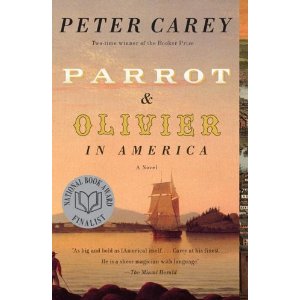 A Light Romp Through Early America
A Light Romp Through Early America
Carey, Peter. (2010) Parrot and Olivier In America. New York: Knopf.
Alexis de Tocqueville was a French aristocrat, philosopher and historian shortly after the French revolution, in the 1830’s. He hated the Bourbon king who was restored to the throne (the counterrevolution), so though he was a noble, he was always in hot water. He escaped to America, where he traveled and made notes. On his return to France, he published Democracy in America (1835), a sociological and political-science essay still admired today.
Carey writes a fictional riff on that life, creating Olivier de Garmont, a young nobleman after the French revolution who fears for his life. He escapes to America, accompanied by his 50-year-old secretary, Parrot, a French-speaking, working class Englishman, son of an engraver who was caught printing counterfeit French currency. Thus the highest of aristocracy and the lowest of scoundrels are tied together in a buddy story.
Though Olivier and Parrot view each other with contempt, they develop a friendship over time, travels and adventures in America. Olivier is puzzled by America, where people do not have servants (slavery stays at the edges and doesn’t figure in the story). He is shocked and disdainful of the raw American culture where people are obsessed by making money. Parrot, however, is exhilarated by the opportunities, but lacks the resource to break free of Olivier and strike out on his own. They describe their experiences in the New World in alternating chapters.
The reader gets a feel for New York and Boston in the 1830’s. Carey’s historical research feels very real, from the food, the clothing, travel, housing, the financial dealings, barroom fights, romantic relationships, and the granularity of everyday life. As a historical novel covering early 19th century New England, it is illuminating and fascinating.
There is no real storyline. The two protagonists have trials and tribulations and grow older. The fun of the novel is in the historical imagination and in the witty writing. Individual episodes are affecting and often complex, but with the structure of a romp or a road trip, it is not a developing drama. The characters don’t change over time, nor does the social environment, so the reader must be content with the scenery, which is interesting and often funny. The writing is also edifying to a reader’s vocabulary. You will need your dictionary.
Charming though the story is, a political dark side is completely glossed over. Olivier’s aristocratic views and sensibilities are undermined by the morally illegitimate status of any aristocracy. He reviles the lower classes for their lack of education, for being dirty, crude, and ambitious, but as with all aristocracy, is unaware that his class rides on the backs of the workers, exploiting them, and depriving them of education, leisure, and self-sufficiency. So Olivier’s views of America are interesting not for any insight, only in demonstrating the ingrained lack of self-awareness that still characterizes the American financial and political aristocracy today.
